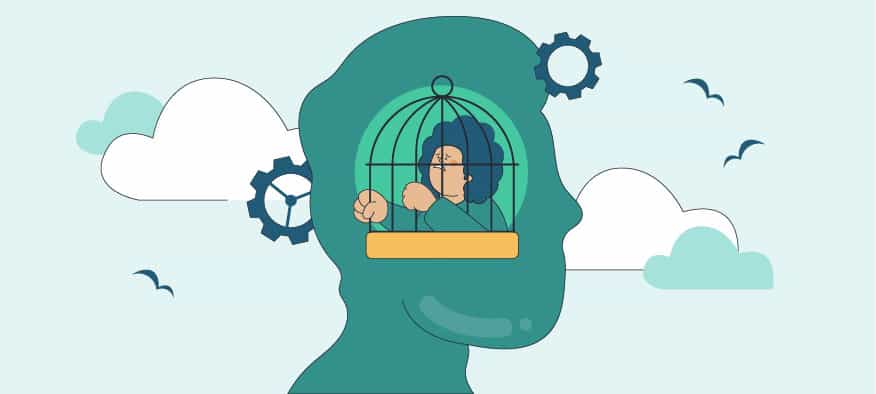
The Victim Mentality And Learned Helplessness
The victim mentality and learned helplessness are two different concepts that are often misused. Learned Helpless is a neurological condition that affects all of us to some degree
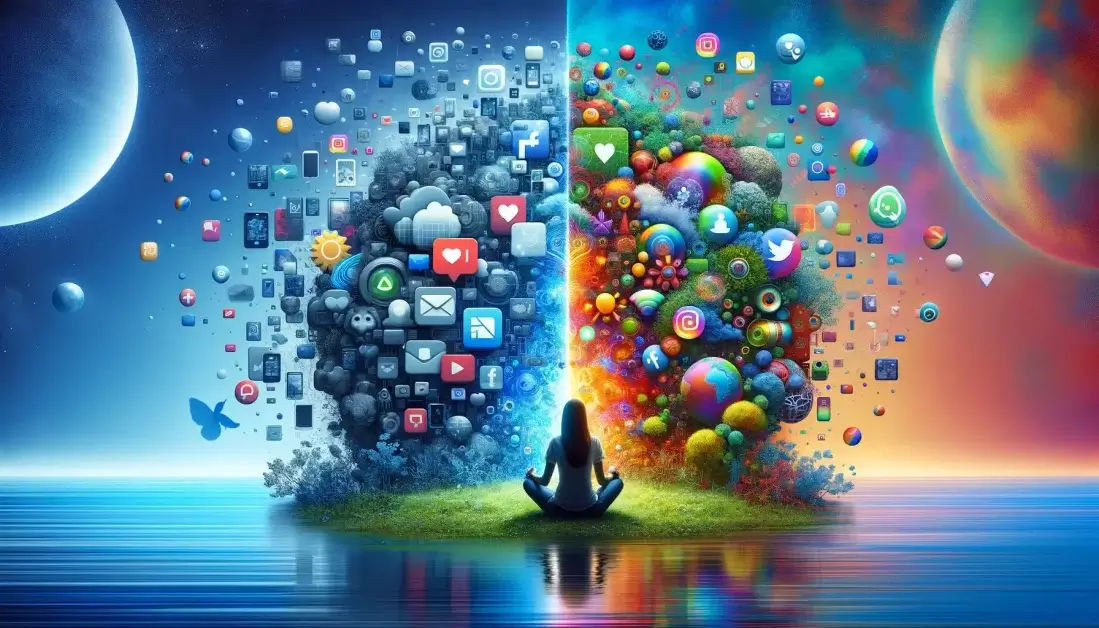
The prevalence of mental health problems is rising at a rate of 13% per year, encompassing a range of conditions from anxiety and depression to various forms of addiction. Recognizing this critical situation, researchers are intensively investigating the proliferation of social media, which is rising in parallel to mental health issues.
For all its controversy, social media provides a powerful tool capable of remarkable benefits. Like all good things, however, too much can be negative.
The key point often overlooked is that the crux of the issue isn’t social media itself – which, at its core, is just another form of technology. The real concern lies in our interaction with it, highlighting a human, not a technological, problem.
This article aims to explore both the positive and negative aspects of social media, from its role in education and entertainment to its links with depression and addiction. Crucially, we will delve into recognizing the signs of social media addiction and discuss strategies for harnessing its power beneficially and healthily.
This study investigated the motivations behind social media use on 385 young Saudi Arabians, a demographic who have a notably high level of social media usage, with 82.3% of the population (29.5 million people) using social media in 2022
Among the criteria considered (entertainment, information, social interaction, privacy, esteem, and communication), entertainment was the most significant reason for engaging in social media (privacy was the least significant)
While entertainment may be the primary motivation behind social media use, its role in connectivity and communication for personal and business use has changed the way the world talks and the way business is done. When building a brand, for example, forgoing social media altogether will leave you in the dust relative to your competitors.
The inventive spirit of social media users has birthed a new realm of entertainment, ranging from trending TikTok videos to influential social trends. Platforms like Instagram have become marketplaces for artists to sell their digital creations, and amateur filmmakers have leveraged social media as a springboard into mainstream cinema industries, an arena previously inaccessible without these innovative channels.
Perhaps most importantly, social media offers a unique platform for personal growth and learning, providing access to a vast array of educational resources and expert knowledge.
Users can engage with instructional content, follow thought leaders, and participate in online discussions and courses, facilitating a rich learning experience. This interactive environment not only broadens knowledge but also enhances professional and personal development.

The study on Saudi youth identified likes, comments, and followers as having the most significant negative impact on mental health.
This aspect creates a reliance on online validation, leading to increased anxiety, feelings of inadequacy, and low self-esteem.
Young users become more susceptible to negative psychological effects due to constant social comparison and the pursuit of approval, which can exacerbate feelings of loneliness and disconnection, despite being active online.
As a result, the researchers suggest caution in engaging with certain social media features, especially those related to likes, comments, followers, media, and posts, due to their potential impact on mental health.
One of the most highly researched areas of social media’s role in mental health is its relationship with anxiety and depressive disorders.
Numerous studies have linked heavy social media use to mental health problems such as anxiety, depression, low self-esteem, and loneliness, where the constant comparison with others’ lives and the pressure to present a perfect image can lead to feelings of inadequacy and stress.
Other notable problems include cyberbullying and harassment, detrimental effects on social skills and maintaining healthy relationships, impacts on productivity, and the development of addictive symptoms.

Anxiety and depression are the most common mental health issues globally, affecting 264 million and 280 million people worldwide, respectively.
But how does social media cause anxiety and mental health issues? This article on 385 participants found that consistent social media users (who were mostly focused on the unhealthy aspects of social such as likes, comments, and favorites) were associated with depression, anxiety, stress, loneliness, poor self-esteem, and addiction.
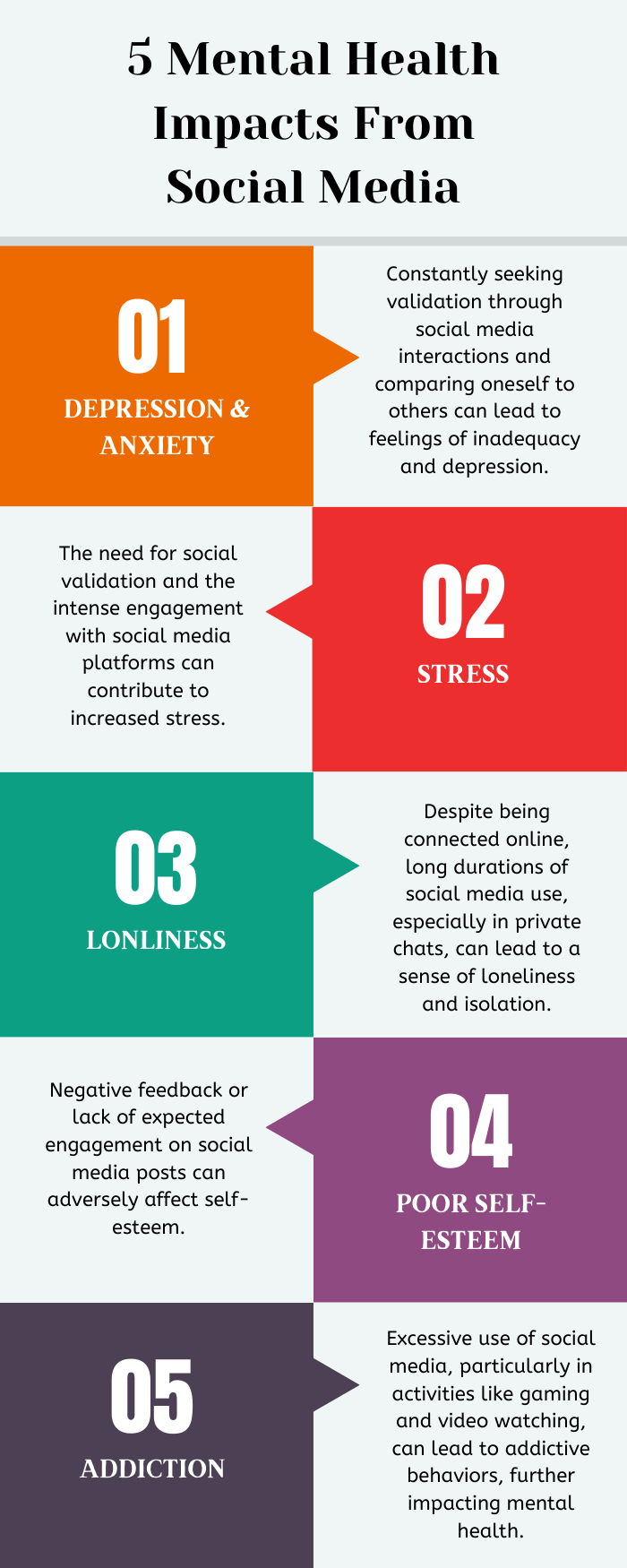
There is a noted increase in mental health issues, particularly anxiety and depression, which coincides with the rise in social media usage. This correlation does not necessarily prove causation, but it is a suggestive relationship that must be explored.
Although the effects of social media use on mental health vary enormously based on the type of social media and the individual circumstances of the user, there are thought to be fundamental mental processes that induce the majority of effects.
Most of these draw on our emotional networks, the fundamental catalysts of all human thoughts and actions. Most social media platforms, for example, encourage users to seek validation through likes, comments, and shares, leading to a constant need for approval, which, when not received, can lead to feelings of inadequacy, low self-esteem, and depression.
The constant need for users to compare the regular parts of their lives to the very best of others leads to negative thought patterns and is often accompanied by the “Fear of Missing Out” (FOMO).
It is important to recognize that various social media platforms possess specific characteristics that shape their usage and their consequent effects on mental health.
Each platform, such as Facebook, Instagram, Snapchat, and Twitter, provides distinct forms of interaction, potentially influencing mental health in various ways.
For those experiencing adverse effects from social media, a great first step is to steer clear of platforms that exacerbate these negative impacts.
Social media usage, when used healthily, can also be a protective factor against mental health issues by providing support and reducing loneliness, enhancing social connectedness, and self-expression. Given its immense influence, educating young adults about healthy social media practices should be an integral part of school curriculums.
What gives social media so much potential for great harm is its addictive nature, often thought to be linked to features such as likes, comments, and notifications, as well as the now infamous infinite scroll.
Dopamine, often dubbed the ‘feel-good’ neurotransmitter, plays a central role in the addictive nature of social media. Each time a user receives a like, comment, or new follower, it triggers a dopamine release, providing a brief peak of pleasure and reward.
This experience induces a small high, creating a powerful association between social media interactions and feelings of happiness or validation.
As with many addictive behaviors, however, there is a diminishing return on this dopamine-induced pleasure over time. The brain gradually adapts to these dopamine surges, meaning that the same amount of social media interaction produces less pleasure than before.
Consequently, users often find themselves spending increasingly more time on social media, chasing these lower highs in an attempt to recapture the initial levels of satisfaction and reward they once felt.
This cycle of chasing diminishing dopamine-driven rewards can lead to habitual, compulsive behavior characteristic of addiction, where the pursuit of pleasure becomes a driving force behind excessive social media use.
This study measured social media addiction in 34,798 respondents from 32 nations spanning seven world regions, finding some rather interesting data and trends.
The average prevalence of social media addiction that met the study’s criteria for “moderate addiction” was 24%, a startlingly high number.
While the lowest prevalence of addiction was found in Western and Northern Europe at 8%, Africa and Asia were among the highest at 37% and 31%, respectively.
Interestingly, collectivist nations, where cultural values emphasize the importance of the group over individual interests, observed a 31% prevalence compared to 14% of individualist nations that prioritize personal autonomy and individual freedoms.
Across different age groups, a higher prevalence was observed among the younger population: 35% in adolescents, 23% among university students, and 19% in adults.
With such high rates of social media addiction globally, researchers have started looking into symptoms and strategies to help deal with the issue.
This study defined addictive use based on the nine symptom criteria for Internet Gaming Disorder (IGD) and Social Media Disorder (SMD), as outlined in the DSM-5.
These criteria include preoccupation, withdrawal, tolerance, unsuccessful attempts to control, loss of interest, continued excessive use, deception, escape, and jeopardizing career/relationships.
These symptoms might often be demonstrated in the following traits.
1. Excessive Amounts of Time Spent on Social Media
This symptom involves spending excessive amounts of time on social media platforms, often at the expense of other activities.
It can manifest as a compulsive need to check social media frequently, leading to hours of usage without realizing the passage of time and often interfering with daily life, including work, school, and personal relationships. The individual may neglect responsibilities or hobbies they once enjoyed in favor of social media use.
2. Scrolling Without Interest:
Often linked to the constant pursuit of dopamine, this symptom is characterized by mindless scrolling through social media feeds without genuine interest or engagement, stemming from an unconscious desire to replicate the fleeting joy or satisfaction previously experienced on these platforms.
Over time, as the brain becomes accustomed to these dopamine hits, the same level of activity yields less pleasure, leading to prolonged and unfulfilling scrolling in an attempt to recapture those initial feelings of enjoyment.
3. Feelings of Guilt: Guilt often arises from the recognition of the excessive time and energy spent on social media, especially when it comes at the expense of more meaningful or productive activities.
Individuals may feel guilty for neglecting personal responsibilities, relationships, or self-care, which can be exacerbated when realizing that their social media usage is not as fulfilling as other activities, yet they feel unable to reduce their engagement.
4. Feelings of Anxiety: Anxiety can be triggered by several factors, such as fear of missing out (FOMO), the need for social validation, concerns over online interactions or feedback, or worry about not being able to check social media.
This anxiety can become a self-perpetuating cycle, where individuals turn to social media to alleviate these feelings, only to find that their online experiences further exacerbate their anxiety.
5. Feeling Irritable and Frustrated
A short temper and frustration are common to most addictions and often occur when the individual does not derive the expected pleasure or reward from social media interactions.
Users may feel compelled to continue engaging with social media due to habit or an unconscious hope of achieving the desired emotional response. Frustration can also be compounded by the awareness that their time could be better spent on more productive or fulfilling activities, leading to a sense of internal conflict and irritability.
See this article here for a complete practical guide on how to start breaking a social media addiction.
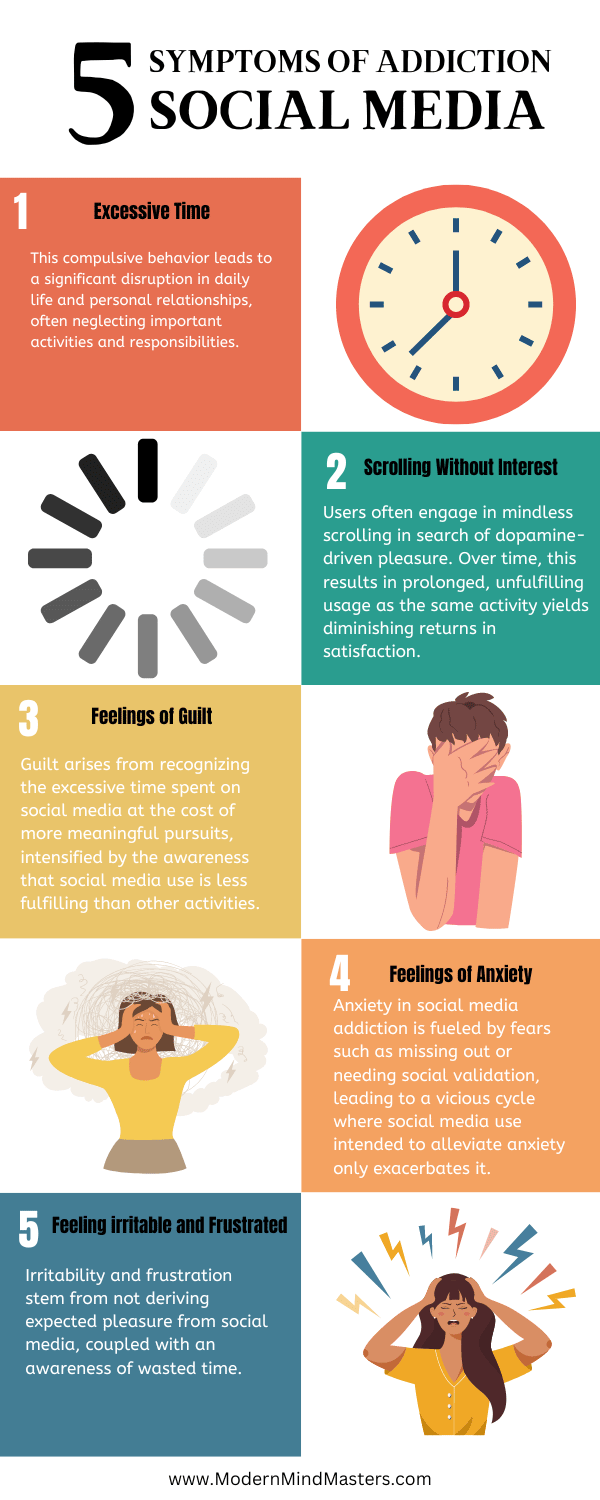
While social media presents a paradox of being both a facilitator for connectivity and learning and a potential catalyst for mental health issues, its impact largely depends on how it is used, and by whom.
Its addictive nature, fueled by dopamine-driven rewards from likes, comments, and followers, can lead to excessive usage and mental health challenges such as anxiety, depression, and low self-esteem.
It’s imperative to recognize the symptoms of addiction, including excessive usage, mindless scrolling, feelings of guilt, anxiety, and frustration, and take proactive steps to mitigate its negative effects.
Social media stands at the crossroads of innovation and influence, demanding a balanced approach to its usage. As we navigate this digital age, it is essential to wield social media not as a crutch for our mental well-being, but as a tool for positive growth, ensuring that we master it, and not the other way around.
Social media can cause anxiety through reliance on online validation, constant social comparison, and the pursuit of approval, leading to feelings of inadequacy and stress.
When left untamed, social media use can affect mental through by causing depression and anxiety, stress, loneliness, poor self-esteem, and addiction.
Symptoms of social media addiction include excessive usage, neglecting responsibilities, mindless scrolling, guilt, anxiety, fear of missing out, and feelings of irritability and frustration when using social media.

The victim mentality and learned helplessness are two different concepts that are often misused. Learned Helpless is a neurological condition that affects all of us to some degree
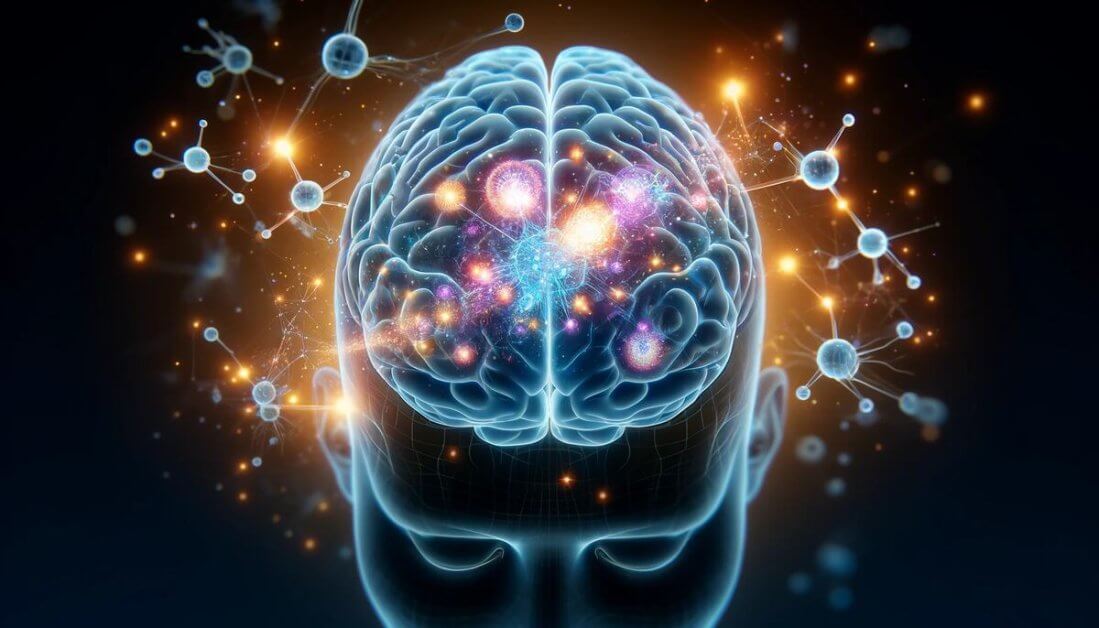
The benefits of dopamine depend on how you use it; too much of a good thing can be bad. Learn how to increase dopamine naturally, while avoiding the pitfalls of overuse.

We all know exercise builds strength and reduces fat, but here are 7 more life-changing benefits and the types of exercise that best promote them.

Explore how to find inner peace through removing distractions, making time to embrace silence, and tuning into your emotions through mindfulness.

The benefits of grounding have been scientifically studied and include reductions in inflammation, diabetes, and stress.
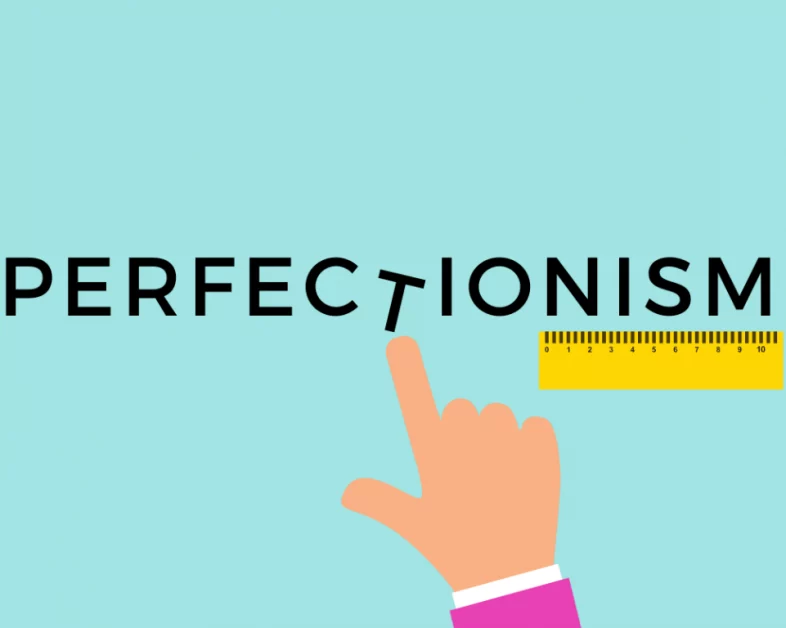
Perfectionists may be known for their high standards and attention to detail, but perfectionism is the enemy of productivity. It also causes much stress and anxiety.
© 2025 Modern Mind Masters - All Rights Reserved
You’ll Learn:
Effective Immediately: 5 Powerful Changes Now, To Improve Your Life Tomorrow.
Click the purple button and we’ll email you your free copy.